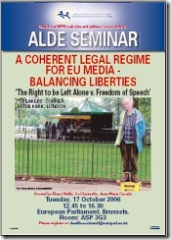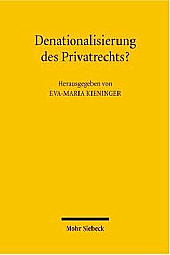Recognition of a Surname and Validity 2
A German case which has been reported on before has now been continued (see for the facts and the history of the case the following older entry: Recognition of a Surname and Validity). After the ECJ has refused to hear the case in its judgment of 27th April 2006 (C-96/04), the parents filed an application at the Local Court (Amtsgericht) Flensburg to instruct the registrar to recognize the double-barrelled name of their son which had been determined according to Danish law and to register their son under this name in the family register. However, according to the Local Court (Amtsgericht) Flensburg, the court is not competent to instruct the registrar to register the applicants` son under this name since German law (§ 1617 I 1 German Civil Code (BGB)) does not provide for double-barrelled names if the parents do not use a common married name. Since the court regards it as a violation of Artt. 12, 18 EC-Treaty to ask a citizen of the European Union to use different names in different Member States, the court sees itself obliged to bring the matter before the Court of Justice according to Art. 234 III EC-Treaty.
Therefore the Local Court (Amtsgericht) Flensburg asked with decision of 16th August 2006 (69 III 11/06) the ECJ to give a preliminary ruling on the following question: "In light of the prohibition on discrimination set out in Article 12 of the EC Treaty and having regard to the right to the freedom of movement for every citizen of the Union laid down by Article 18 of the EC Treaty, is the provision on the conflict of laws contained in Article 10 of the EGBGB valid, in so far as it provides that the right to bear a name is governed by nationality alone?" (see C-353/06)
We await the decision with interest.




 Speeches which have been held to celebrate the 70th birthday of Karl Kreuzer have been published in the following volume: Eva-Maria Kieninger (ed.),
Speeches which have been held to celebrate the 70th birthday of Karl Kreuzer have been published in the following volume: Eva-Maria Kieninger (ed.),